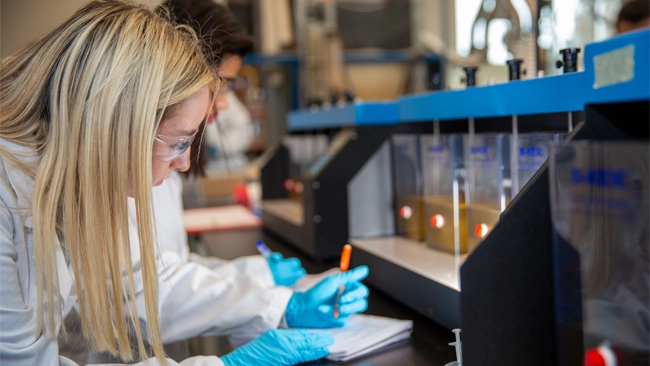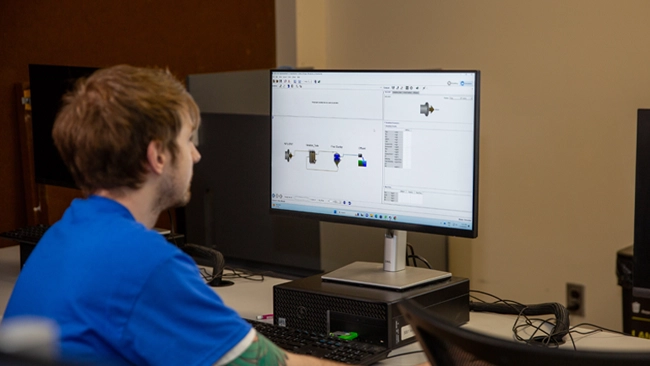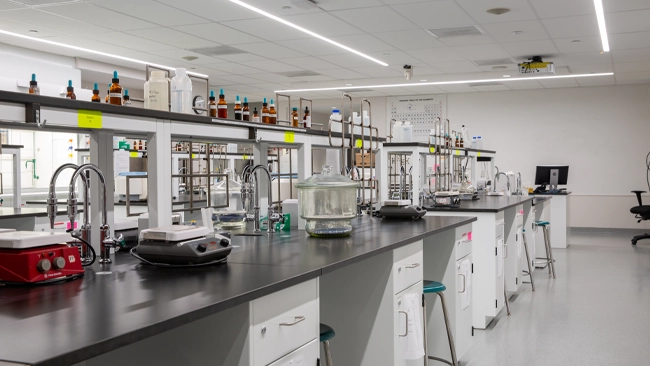
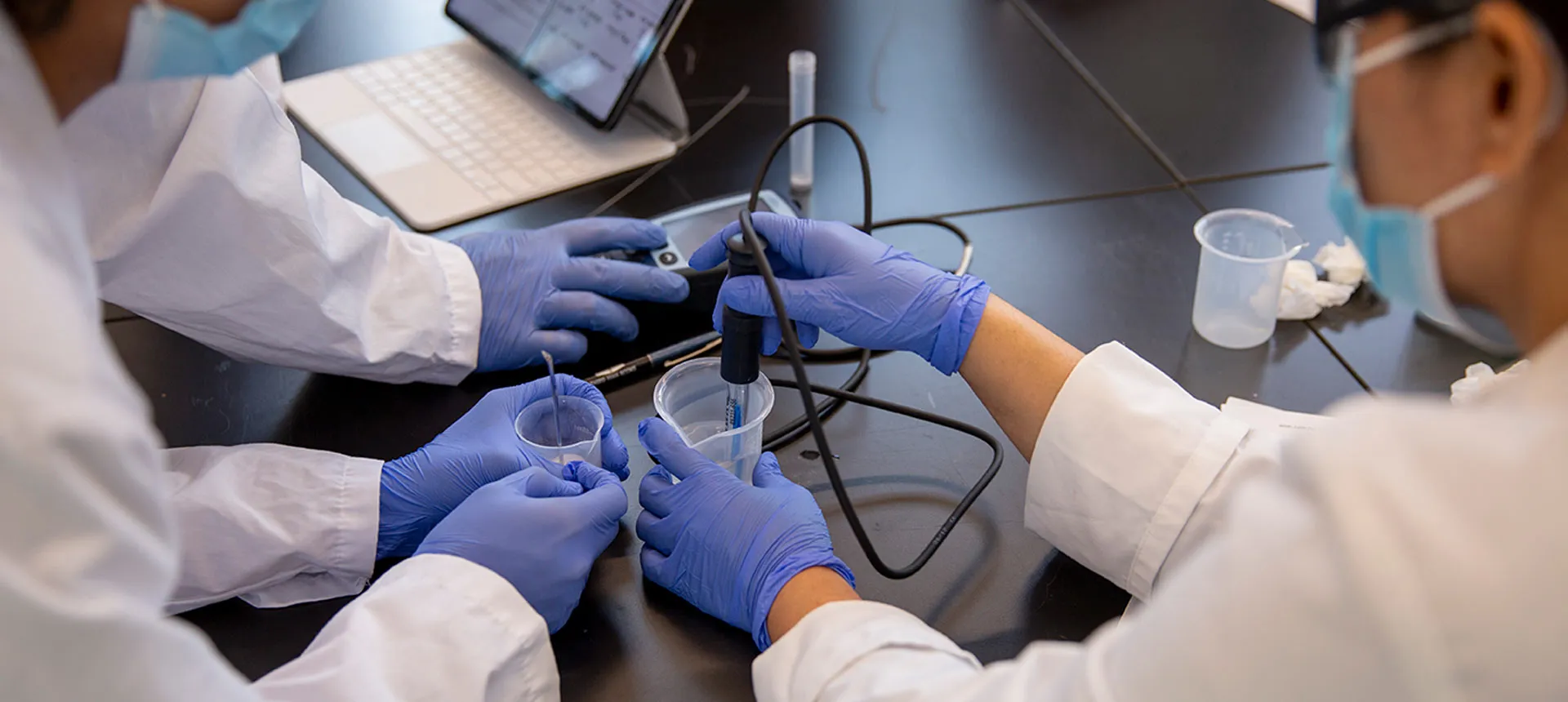
Environmental Technician - Water Treatment Operations
Overview
Discover one of the most in-demand jobs in the province! Learn to operate, maintain, test, and repair drinking water treatment supply and distribution, and wastewater treatment collection systems to ensure regulatory compliance.
Environmental Technicians, specializing in water and wastewater treatment, are in demand in Ontario for a variety of sectors including mining, oil and gas, the public service and private industry. The Environmental Technician - Water Treatment Operations College diploma is a fast-track to qualification for employment as a licensed operator in both drinking water and wastewater treatment.
Students enrolled in this program will train in Lambton College's new Centre of Excellence in Energy & Bio-Industrial Technologies. The Centre offers state-of-practice technology laboratories and infrastructure to support learning and research in next-generation technologies in collaboration with industry.
The program has an innovative compressed delivery model, allowing students to graduate faster - in two years instead of three - by combining theory and practical systems operator experience, in conjunction with three co-op work terms.
Students can expect to be exposed to current industry equipment as well as a pilot scale system during their studies. Students learn the theory and practical skills required to be successful in the operations and maintenance of water and wastewater systems, as well as compliance.
An Overview of our Unique Program
Hear from program coordinator, Erin Soeder, about how our program is unique.
Learn about the delivery model, the unique job prospects and how we maintain a 100% hire rate for our graduates.
Admission Requirements
O.S.S.D. or equivalent with:
- Grade 12 English C or U
- Grade 12 Mathematics C or U
- Grade 12 Chemistry C or U (recommended)
Grade 12 Mathematics Requirement
Grade 12 Mathematics for College Technology or any grade 12U mathematics is recommended; Grade 12 Foundations for College Mathematics (MAP4C) minimum final grade is 60%. If the program is highly competitive, students with Grade 12 Mathematics for College Technology or any Grade 12U mathematics will be given preference.
Mature Student Assessment for this program is available in the subject of English for the purpose of demonstrating proficiency in this required admission subject. For all other admission requirements, applicants must complete the required course(s) as listed above. For more information, please contact counselling@lambtoncollege.ca. Review the Mature Student Admission process.
Academic admission requirements can be obtained through Academic Upgrading and the Pre-Technology & Trades (PTEC) program at Lambton College.
Operator-in-Training Exam
The curriculum focuses on preparing students to write the Ontario Operator-in-Training examinations and the Drinking Water Operators Entry-Level course through the Walkerton Clean Water Centre and the Ontario Ministry of the Environment, Conservation & Parks.
These certifications are completed during the term - right on campus.
Hear from our Graduates
Listen to where Rob and Miriam found themselves after graduating from Lambton College as they describe their positions in the Water and Wastewater industry.
Costs
- Year 1 $6,086.72
- Year 2 $3,071.92
Please Note: These fees apply to the 2024-2025 academic year and are subject to change. Fees do not include books (unless specifically noted), supplies or living costs.
Additional Fees
-
Operator in Training Exam & Certificate$210.00
-
Lab Coat$40.00
-
Calculator$40.00
-
Safety Shoes$150.00
-
Safety Glasses$20.00
-
World Water Operator Training Company Manuals (Required Fee is per term)$350.00
Scholarships Available
There are 9 scholarships available for this program, with a total value of $2,250!
Technology Requirements
In order to keep pace with the requirements of each and every course in your program, Lambton College requires that each student have access to a laptop while studying at our college.
Labs & Equipment
Courses
Critical Thinking and Writing
In this writing course, students respond to current issues and news articles via various styles of paragraphs and essays. Students practice thinking critically and organize and hone their writing to ensure clarity and correctness in their messages. Students explore different perspectives, and through synthesis, analysis, and response, strive for clarity of message and diplomatic expression of opinion based on fact. One of the pillars of Lambton College is a commitment to sustainability and equity, diversity, and inclusion, including Indigenization of the curriculum; where appropriate, readings in this course will reflect this commitment. Critical Thinking and Writing lays the foundation for a subsequent research-writing course.
Introduction to Mathematics I
This is the first of two courses designed to provide the student with a fundamental understanding of mathematical concepts. This course reviews and enhances topics in numeracy, measurement, graphs, algebra, solving equations, and statistics. Competent use of a scientific calculator is also emphasized.
Workplace Communications Applications & Analysis
In today's management and administration workplace, having strong computer skills is essential. This course provides students with resources and guidance to develop skills in Microsoft Office applications, focusing on three key areas: Word, Excel, and PowerPoint. While learning about these programs, students develop skills in time management, accountability, and their ability to follow direction.
Job Search and Success
This course provides student with skills and knowledge to help support their career search and succeed in the workplace. Students align their personal skill set and goals to guide them on their career paths. They will learn how to effectively conduct a job search, build a professional and well-tailored resume and cover letter, and develop and practice interview techniques. Students will also develop their personal brand to help support effective career networking and aid in their job search. Teamwork and collaboration in the workplace are also discussed. Self-reflection is used to inspire insight and support their professional career journey.
Introduction to GIS
Introduction to GIS introduces students to Geographic Information Systems, focusing on the principles of managing, analyzing, and visualizing spatial data. Using QGIS and ArcGIS Online, students will learn to manipulate geographic databases, generate reports, and create maps, gaining hands-on experience to solve real-world problems.
Chemistry and Physics
This course introduces a selection of foundational concepts of chemistry enabling students to understand the fundamentals of water chemistry and of water quality data, such as pH, dissolved electrolytes, disinfection and water hardness. The laboratory portion is designed to apply the above theoretical concepts while developing basic skills of manipulation and careful observation through experiments involving quantitative and qualitative analysis.
Water Monitoring and Sampling
This is a course designed to introduce basic sampling and analytical techniques to water and wastewater plant operators. The course concentrates on sampling techniques and necessary lab skills. Students learn how to develop sampling plans and take representative process samples that are free of contamination due to handling. They also learn the proper techniques and instrumentation for performing comprehensive laboratory analyses on water and wastewater samples.
Introduction to Wastewater Collection and Treatment
This course is a detailed examination of the techniques and principals involved in the proper collection and treatment of wastewater. The course concentrates on the purpose of wastewater collection and treatment systems, the major sources of wastewater and the technology available to combat wastewater disease. Topics discussed include an overview and history of collection and treatment systems, wastewater equipment and facilities, preliminary and primary treatment, activated sludge control, basic process responses and interactions, and a general survey of different types of wastewater management systems. Lecture material is supplemented with a visit to one of the local facilities in order to view how the concepts discussed in class are being implemented by industry and by municipalities.
Soil and Air Monitoring and Sampling
This is a course in basic soil and air sampling and analytical techniques for waste facility workers. Preliminary topics to be covered include soil characteristics, soil classification, soil monitoring and sampling, the composition of our atmosphere, air pollution, and air quality monitoring and sampling. Field and laboratory sessions will involve the application of these concepts as they are introduced in lecture.
General Education Elective
Communications for Technology
Technical writing differs from most student writing; therefore, it is necessary for students to learn the structure, nuances, and style of technical writing to be successful in completing labs, summaries, and reports. Through research writing and documentation, and through oral presentations, successful students will gain important transferrable skills that provide the basis for technical communication required in their other coursework and the workplace.
Water Treatment Plant Instrumentation and Controls
EVL-4016 will encompass the basics of industry safety and job planning, electrical service concepts, instrumentation, final control elements, process control theory and devices, as well as process control systems.
Pumps and Motors
Operating equipment pertaining to various types of industries will be discussed. This course contains a practical approach to pumps, internal combustion engines, fire hydrants, lift stations and lubrication fundamentals. The principle of operation, types, parts, operation and basic maintenance of these types of rotating equipment are covered. This course discusses the basics and application of fluid properties. An overview of rotating electrical motors and generators is also included.
Plant Operations
This is a course in basic soil and air sampling and analytical techniques for waste facility workers. Preliminary topics to be covered include soil characteristics, soil classification, soil monitoring and sampling, the composition of our atmosphere, air pollution, and air quality monitoring and sampling. Field and laboratory sessions will involve the application of these concepts as they are introduced in lecture.
Waste Characteristics
This course examines concepts important to the operation of wastewater treatment (WWT) facilities. The activated sludge treatment process is investigated in detail. The importance and role of microorganisms in wastewater treatment is also examined. Students will perform a lab to assess the solids content of a wastewater sample.
Disinfection Methods
This course deals with chlorine and chlorination systems, their installation, storage and handling, safety practices, start up and shut down procedures, maintenance, and troubleshooting. Students will further investigate new and emerging threats to water and wastewater systems, as well as evaluate different treatment alternatives.
Independent Study for ELC
This is the Self Study portion of the Entry Level Course for Drinking Water Operators, as delivered by Northern College under license by the Ontario Ministry of the Environment and Climate Change (MoECC). Students must read the Textbook, guided by the practice questions in the Self-Study workbook, and successfully pass a comprehensive Self Study test (70%) before proceeding to take the Classroom portion of the Entry Level Course, as delivered in EVL3005 Certification Preparation.
Certification Exam Prep (OIT and ELC Classroom Portion)
EVL-3005 is a course in two parts. The first module, OIT Preparation, prepares students to write the Operator In Training examinations in Water Treatment, Water Distributiuon and Supply, Wastewater Treatment, and Wastewater Collection (MOECC/OWWCO). These examinations are prerequisite to being able to work in the water/wastewater treatment industry as an Operator In Training (OIT). The second module, Entry Level Course for Drinking Water Operators, is the mandatory 35-hour classroom component of the Entry Level Course for Drinking Water Operators, delivered by Northern College under license by the Ontario Ministry of the Environment and Climate Change (MOECC).
Problem Solving in Water and Wastewater Treatment
This is a course in applied mathematics for water and wastewater treatment operators. Major topics covered include conversions, basic water treatment mathematics. A methodology of problem solving will be developed which will enable students to successfully deal with a wide variety of practical scenarios.
Co-op Work Term (optional)
Co-operative education provides students with the opportunity to apply classroom learning to the workplace, undertake career sampling and gain valuable work experience that may assist students in leveraging employment after graduation.
Co-op Work Term (optional)
Co-operative education provides students with the opportunity to apply classroom learning to the workplace, undertake career sampling and gain valuable work experience that may assist students in leveraging employment after graduation.
Laboratory Procedures
This course will review new and emerging drinking water threats as well as look at a multi-barrier approach for disinfection of potable water. The course content will review the leading technologies being deployed to meet today's drinking water quality standards. Students can expect to study and analyze all different types of new and emerging technologies and how they can be integrated into existing facility designs. Students will also review some of the industry challenges as they emerge, for example, output production, measurement and detection, funding for improvements and training.
Wastewater Digester Operation and Nutrient Removal
This course focuses on two specific areas of wastewater treatment: Module 1 begins with an overview of wastewater processes, then concentrates on Biological Nutrient Removal (BNR) . BNR is a process tackling the reduction of polluting chemical nutrients that are not eliminated via the normal activated sludge treatment process. Module 2 focuses on the operation of sludge digesters -- a biological treatment step that reduces the sludge volumes and produces a sludge free of bacteria and pathogens -- safe and dirt-like.
Mechanical Practices for Operating Engineers
This course is intended to develop the introductory mechanical skills required by an Operating Engineer and those who work in a process-related position. Certain types of jobs in the field of Operating Engineering will require varying levels of hands-on mechanical skills. Students in this course will develop an understanding of energy isolation, various types of fluid conductors, gasket selection and installation techniques, blank and blind usage, pressure testing, shaft alignment, fire extinguisher usage, compressor fundamentals, and procedures for rigging, hoisting, and proper communication.
Hydrogeology
This course introduces the student to the principles of hydrology and hydrogeology and how they relate to water, wastewater, and waste management. The course is introductory in nature and covers a broad range of topics. This course will enable the student to understand the terminology and basic concepts of hydrology, the hydrologic cycle and related geologic principles. Water quality and contamination, and principles of its measurement, site analysis, and clean-up will be studied. The successful student should be well prepared to participate in site investigations and well site planning by understanding the major variables and influencing factors on both surface and groundwater systems.
Environmental Regulations and Legislation
This course offers an introduction to, and understanding of, several Acts and Regulations that Environmental Technicians and Water Treatment Technicians will encounter. Students will be introduced to these Acts and shown how to interpret them. They will additionally learn how to plan strategies for, comply with, report, and act on environmental incidents.
Health and Safety for Industrial Processes
The graduate of this course will have a good understanding of safety aspects of the law, the legal responsibilities of the workplace, and his/her own legal rights and responsibilities, as well as work processes and procedures being used in present-day industry. This course will give them a basic understanding of the Occupational Health and Safety Act and its associated Regulations, and an understanding of health and safety issues in an industrial setting.
General Education Elective (take 2)
Co-op Work Term (optional)
Co-operative education provides students with the opportunity to apply classroom learning to the workplace, undertake career sampling and gain valuable work experience that may assist students in leveraging employment after graduation.
Contact
Program Information
Applied Science, Engineering Technology & Trades
After Graduation
Employment Opportunities
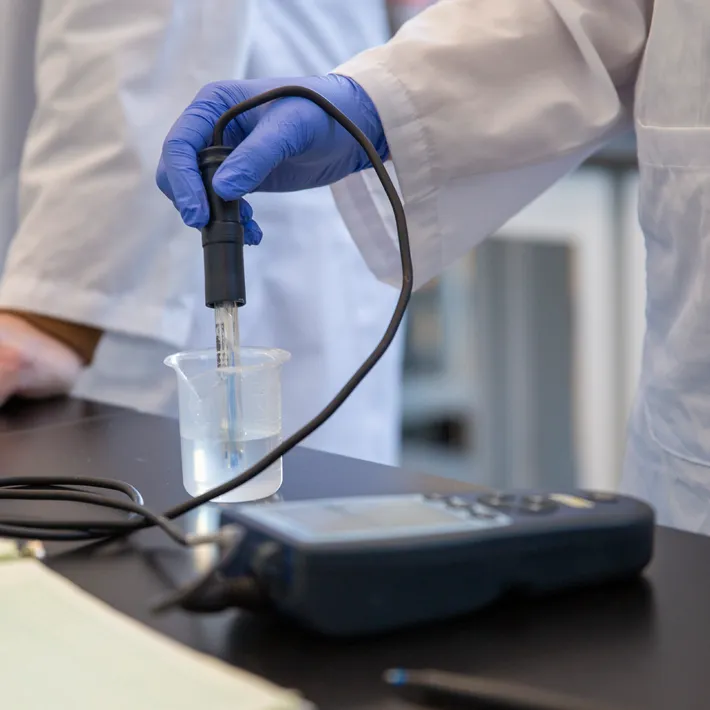
Our graduates pursue a broad range of exciting employment opportunities. They find employment in Ontario's municipal and aboriginal water and wastewater facilities, environmental departments in mines and other industries, solid waste management facilities and in government.
A wide variety of career opportunities that are dynamic and challenging that also offer a competitive rate of compensation are available to graduates. Career positions may include, but are not limited to: environmental systems operator - water treatment, water purification, sewage, waste treatment, wastewater and water treatment plant operators; and liquid waste process operator.
Pathways
Transfer to Programs within Ontario
We've worked with Ontario colleges to offer the following transfer opportunities:
Co-op
About Co-op
Students in this program have the opportunity to gain valuable work experience by applying classroom learning during co-op experiences.
Learn more about co-op terms and the roles and responsibilities of students and co-op advisors.
Co-op Employment Facts
With Environmental Technicians being one of the most in-demand jobs in Ontario, it is no wonder that we have more co-op placements than we do students.
Co-op placement rate for the past three years
Pass rate on OIT exams
Paid co-ops
Operator in Training (OIT) Application and Exam:
Students who wish to obtain a co-op placement will also need to hold a valid Operator in Training (OIT) certificate as mandated by the Ministry of the Environment. Students will be offered the opportunity to write the OIT exam at Lambton College during their second academic term prior to their first co-op placement opportunity. The application process will begin in January of Term 2.
Operator in Training (OIT) Examination Eligibility
To be eligible to write the OIT examinations, the Ministry of the Environment requires all students writing to have their high school diploma or Grade 12 equivalency in order to qualify to write the exam. For further information as to what the Ministry considers equivalent please refer to the OWWCO website (Guideline 3.1)..
Accreditations & Certifications
Class 1 Operator License
In combination with the co-op work terms, graduates may obtain the practical experience required to graduate with a Class 1 Operator license. This is subject to specific co-op work experiences and number of hours worked in accordance with the Ontario Water Wastewater Certification Office (OWWCO).
More Information
Women in Technology & Trades
Our Faculty
Our faculty are industry professionals and care about success of our students.
Hear from our own students, about their experience with our program instructors.
Skill Demands
Sampling, analyzing, document and record control, pump operation inspection and maintenance, instrumentation and control.
Technology Requirements
It is recommended that students purchase a laptop with a Windows operating system.
Internet Speed Requirements
For best performance for students learning remotely, an internet connection with a minimum of 40 Mbps download and 10 Mbps upload speed is recommended in order to effectively use video conferencing and remote lecture delivery software as well as, other online resources remotely. Due to the large area over which students may be dispersed, we are unable to recommend a specific provider, so you will need to inquire around your area to find one that best suits your needs.
Minimum Laptop Requirements
In order to access the internet and virtually-delivered software and courseware, student laptops should include the following at a minimum. By meeting the following specifications, students will be equipped to access software and courseware on their laptop through the internet:
- Intel i5 8th Gen Processor or equivalent
- 16 GB of RAM (with a minimum of 8 GB)
- 100 GB HDD or more
- HD Graphics
- Webcam with a microphone
- Wireless 802.11n/ac 5ghz capable
- Windows Operating System (Windows 11)
Please note that Chromebooks and MacBooks may not support all software required for your program; students should verify compatibility with their professors.
Software
To ensure students are getting the most our of their classroom experience, some software will be required.
Lambton College has made this software easily accessible online. Students can leverage our Microsoft Office 365 software packages and services. In addition, much of the software you require for your courses will be available on demand for use on any device - on or off campus.
